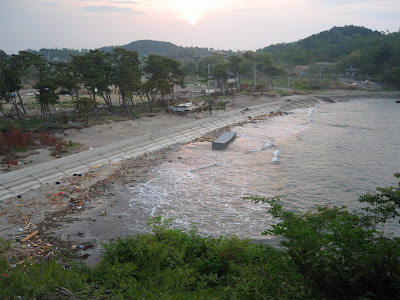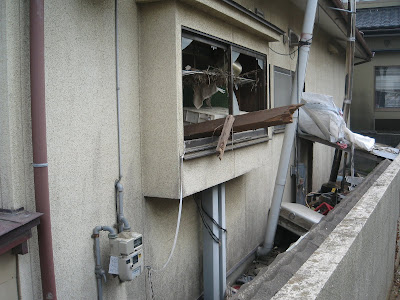 On the finished veranda.
On the finished veranda. One house standing in Takayama area.
One house standing in Takayama area. A road?
A road? Containers on the beach.
Containers on the beach. Now a very small beach.
Now a very small beach. Temporary housing in Takayama.
Temporary housing in Takayama. Tents at Enshu University campus.
Tents at Enshu University campus. Big peace boat team.
Big peace boat team. Messages of hope at the campus.
Messages of hope at the campus. Going to registration.
Going to registration. Labelled and ready to work.
Labelled and ready to work. Our team.
Our team. Mr and Mrs. Ss neighbour's house. Awaiting demolition.
Mr and Mrs. Ss neighbour's house. Awaiting demolition. Across the road.
Across the road. The stinky gutter drain, not draining.
The stinky gutter drain, not draining. The dining room.
The dining room. Their garden, looking tidy.
Their garden, looking tidy. Telling their stories.
Telling their stories. Oil out of the gutter drain channel.
Oil out of the gutter drain channel. A car?
A car? Bags of muddy oil. We made maybe over forty of these.
Bags of muddy oil. We made maybe over forty of these. Bulging veranda.
Bulging veranda. The oil under the mud.
The oil under the mud. Filling buckets.
Filling buckets. The bent structure.
The bent structure. Team work.
Team work. Trying to flatten it, but it cracks.
Trying to flatten it, but it cracks. Cleaning out all the mud.
Cleaning out all the mud. Coating the ground with lime.
Coating the ground with lime. Fixing the screws in.
Fixing the screws in. Finishing it off.
Finishing it off. World's biggest and heaviest dresser.
World's biggest and heaviest dresser. Who took this?
Who took this? Thanks for being such dear people. I hope we can meet again.
Thanks for being such dear people. I hope we can meet again. Near Ishinomaki harbour.
Near Ishinomaki harbour. Grounded ship.
Grounded ship. Upside down car.
Upside down car. Destroyed housing.
Destroyed housing. Another grounded ship.
Another grounded ship. Part of a huge patch of destroyed housing.
Part of a huge patch of destroyed housing. Mr. S's paper company.
Mr. S's paper company. Part of a huge wall of trash. Including cars!
Part of a huge wall of trash. Including cars! Restaurant or showroom maybe.
Restaurant or showroom maybe. A band of colour in a sea of grey.
A band of colour in a sea of grey.I have been wanting to go up to Tohoku and help in a more practical way, for a long time. I have volunteers who are training to work up there, staying in my house, but I have so far remained far from the devastation, and whilst I have seen loads of pictures and heard loads of stories, I had not experienced it for myself. I had a chance yesterday, when I happened to be free at the weekend, (when I am usually busy) and there was a space in a car to go. Ishinomaki is a long way from Tokyo, and along with Kessenuma is one of the hardest towns hit. We gathered at 9pm, and were assembled and aboard the car by 9.30. I can never sleep much in vehicles, including long hauls, and this one was no exception. We arrived near Sendai in the early morning, and had a Japanese breakfast in a local restaurant. We were 2 from Zimbabwe, 1 from Cameroon, 1 from Sri Lanka, 1 Japanese woman qualified in massage, and me from the UK. A pretty international well-mixed? bunch. What would a Japanese think? Scary probably! The African students don't like fish and rice three times a day, and we managed to get the restaurant to boil their eggs for them, so we ate a good breakfast. First we stopped off at Takayama. It was a beautiful little collection of beachside cabins on two wooded hills, looking down on the Pacific sea. Fortunately the houses are still there, but with the sinkage of the land caused by the magnitude 7 earthquake, the beaches there are considerably smaller than before, and look even smaller because they are adorned with huge containers that have washed up there.
From there we went to Senshu University's Ishinomaki campus. It is the site for citizens' volunteer work. Ishinomaki is very well organized. You register, get a badge and insurance, they provide you with masks, buckets, gloves, shovels, billions of garbage bags, and a sheet detailing a job and a location map. There were a lot of tents there on the site, many were peace boat volunteers. We set off and went about 6km to an area of housing about 800 meters from the sea. Mr and Mrs. S are living in an evacuation center, but wish to return to their home. They have done a lot of work on it already and we were the third group of volunteers. A carpenter had cut out most of the floor in the kitchen and dining rooms, so that the volunteers could dig out all the oily stinky mud from under the floor. The tsunami had not only smashed windows but wrecked most of the furniture downstairs. It rose upto 180cm and stayed at that level for several days. The ground under the floor was covered with lime, to cleanse it and right the ph level. Our job was to do a similar thing with their badly bent veranda. It had lost most of its glass, the floor was there but very warped and it hid tons of slimy, oily mud. We took it apart and scooped the mud into bags which we took to a nearby dumping point. The neighbours houses were in various states of disarray, some being left to be torn down, and some to be repaired. Some neighbours had moved, some were in evacuation centers, and some were dead or missing. We finished this job and also cleaned and reinstalled a large dresser and then I went to try and clear out the gutter. This was an impossible task, I could only do a bit. Down every road are these gutters, which are supposed to drain away the rain etc, but they are completely filled up with garbage and heavy black oil. They are stagnant and wreak. If these can not be cleared it will be very difficult for residents to return here, especially in the rainy and hot seasons. They lost both their cars so they travel by bicycle from the evacuation center to clean up. The garden now looks fairly cared for. Every day they must pass their devastated community, and their life is an endless round of cleaning and clearing and fighting with grey dust, dirt and oily mud. They want to tell their stories, so I asked Mrs S for her story, which included a little miracle.
When the earthquake struck she and her grown up daughter were watching TV. They announced the tsunami warning, and so she grabbed a nearby small basket, and started to put in her bank books, essential ID and stuff, ready to run. Too late! With a roar the glass broke and the tsunami almost instantly filled the room. She and her daughter rushed to the stairs and made it to the second floor. All electricity and communications were gone. In a few short minutes, their lives had been drastically changed. They heard screams but did not know who or where. It was pitch black at night, and it snowed. The snow froze so they licked the ice. They were rescued three days later by a boat and went to the evacuation center. When the water went down they returned to the house. All the stuff downstairs was completely trashed or gone, except for the dining suite, and the sofa, which, being wood, had risen up and floated. Unbelievably, perhaps a little damp but still unharmed, was her precious basket sitting on the sofa. Not having their documentation or bank books was a nightmare for so many people, so she was so glad to have it. She showed me the basket.
Nearby, there is a small canal, and she was walking along it, on about the fourth day, when she and her husband finally met. He had been at another location and had no way of finding out what had happened to her. When the water went down, he returned to the house to look for her and found her on the dyke. When Mr. S. told me this story, with a big smile, he could not help his arms rising up, so I knew that they had flung their arms around each other. He was working at a paper works, only a hundred meters from the shore and had evacuated higher up. His company is in ruins. They had two dogs who were in one of their cars at the time. The car was left upside down and filled with water, but there was a small air space and their burmese mountain dog? a big black and brown and white dog, managed to survive.
We were able to laugh with them and cry a little with them and our Japanese member gave them each a thorough massage. Human touch is very important when your life is so hard and stressful. They were both rosy and smiling when she had finished. We also asked them what evacuees really need, as the red cross money has not arrived, and people do not know what is really necessary. People living in temporary housing, or who move into apartments or houses will get all their new appliances from the government. However, those who stay and try and rebuild, get only about 58 man yen from the government. She says that with this they can repair the bathroom and that is all.
I hugged them when we parted, and they said that they were so grateful because the volunteers were all so kind and had such kind eyes. I, in turn admired their graciousness and cheerfulness and their willingness to rebuild and accept much needed help in the face of such horrible destruction.
After this we drove through Ishinomaki harbour area, and past Mr. Ss paper company. We drove past the huge four story hospital where people were rescued from the roof, and a burnt out school where the children lost their lives. I took some photographs, and I post them, though nothing could really prepare you for the reality of the destruction there. The strange stagnant rotting smell, the kilometers of garbage. I felt bad taking photographs whilst people wandered or searched in the remnants of what were their homes. I had to think hard about this feeling. I realized it was that I felt like a voyeur. What is intimate and private was exposed, and laid bare. The details of peoples lives, their precious objects that they cared about were now just on display, and not even precious, just a mound of utter filth, dirty, dusty, exposed, worthless. And as I looked at these kilometers of grey mess, I saw a band of colour and the tears squeezed out of my eyes. There, in that huge grey mass, was an orange and gold obi, doing what an orange and gold obi does. It was winding, and it was being a beautiful band of colour, in an ugly and obscene and disgusting landscape.
